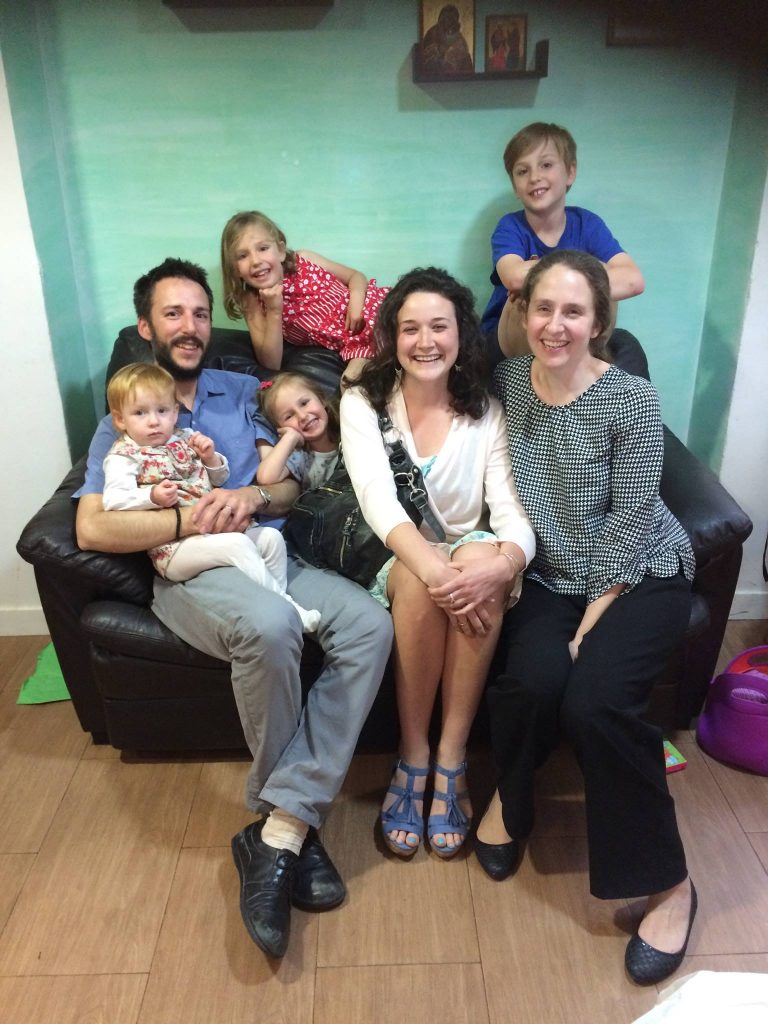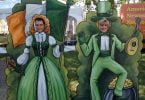
by Olivia Martin
ATCHISON — “For better or for worse, we have never really had a plan for our life. It often has been distressing, but usually has turned out better than we could have planned.”
This is what my friend Aaron Riches said of his wife Melissa and his life as we sat in the sun on a rare, warm December day in 2018.
I met that day with Aaron, Melissa and their five children for a pre-Christmas hike and lunch in Weston, Missouri.
We’d been meaning to get together for months, but between Melissa homeschooling the children, Aaron’s new job at Benedictine College and my travels, finding a free afternoon was no simple task.
But finally together, I asked them to tell a bit of their story. And now I want to share it.
“We met on the corner of Stanton and Allen on the Lower East Side,” said Aaron. “It was a chance meeting of two people who shouldn’t have met but for some unexpected reason we did meet.”
This sentence perfectly expressed, too, the odds of my meeting the Riches family.
Practically speaking, we never should have met.
Catholic author Graham Greene once wrote, “A story has no beginning or end: arbitrarily one chooses that moment of experience from which to look back or from which to look ahead.”
And this is my belief as I tell some of the story of how this family’s life and mine became entwined.
I choose to tell this story right where Aaron began — in New York City on the corner of Stanton and Allen in the ‘90s.
A great love
At first glance, it would seem that random street corner was all Aaron and Melissa had in common. Aaron was Canadian, an atheist and a member of an indie rock band based in Toronto.
Melissa was the daughter of a Protestant minister working for an NGO in New York City.
Despite their differences, something unexpected happened.
“A friendship developed between Aaron and his friends from Toronto, who weren’t Christians,” said Melissa, “and my friends in New York City — and we were evangelical Christians.”
And this newfound group of friends started doing a Bible study together.
“Melissa’s friends were guys who drank beer, smoked cigarettes and . . . they were into indie rock,” said Aaron. “They were normal people with great friendships who did all the normal things and none of the dumb things that other people did — and they did Bible study on the Acts of the Apostles! I couldn’t believe it.”
This synthesis of friendship, faith and authenticity attracted Aaron to the Christian faith. He and Melissa started dating, became engaged and both converted to Anglicanism.
After they were married in the Anglican church, they moved to Montreal where Aaron finished his master’s degree in English literature. In the process of working on his master’s, Aaron discovered the works of Anglican theologian John Milbank and philosopher René Girard; he says their works saved his life.
“[As] I was writing my master’s thesis . . . Melissa kept saying, “You should apply to study theology; you don’t like Judith Butler and Michel Foucault as much as you like Rene Girard and John Milbank.”
He knew she was right.
After finishing his master’s, the Riches moved to Charlottesville, Virginia, where Aaron started a master’s in theology. Through these studies, Aaron and Melissa underwent a second conversion.
On Easter Sunday 2005, St. John Paul’s last Easter, they entered the Catholic Church together. Thus started the grandest adventure of their lives.
A place to belong in the church
After graduating with his master’s in theology, Aaron was accepted to Ph.D. studies in Nottingham, England, studying under John Millbank — the same theologian whose works he credited with saving his life.
In the five years they lived in Nottingham, Aaron and Melissa had their first two children and encountered the Catholic lay movement called Communion and Liberation (CL) through a young Italian theology student named Michelangelo.
A master’s student himself, Michelangelo came to Nottingham from Milan to study under John Millbank as well. He and Aaron quickly became friends.
“He was an impressive 22-year-old guy,” said Aaron. “He said he was going to do ‘School of Community’ (the weekly meeting of CL) because he was part of this thing called Communion and Liberation and there was no one else in the town who was part of it. So, he said, ‘We’re going to do it in your living room!’”
With that, a community was born in Nottingham.
From that point forward, the Riches found CL to be a place within the church to which they felt they deeply belonged. And they adhered to it.
“The real experience of the movement (CL) is that you have a group of people that you have a common history with, knit into one historical experience,” said Aaron. “And from that experience you have tools to judge your life, to verify the presence of Christ in your life and to move forward in life and faith.”
And the Riches have never ceased to be asked to move forward in both.
Learning to follow
After five years in Nottingham, Aaron finished his dissertation. However, he was unable to find work, and their young, growing family seemed to be running out of options.
“We were thinking we’d come back to the United States and live at my aunt’s house for free and collect unemployment,” said Aaron. But mere days before they were scheduled to return to the States, Aaron received a phone call from a friend in CL in Italy with unexpected news — Archbishop Javier Martinez in Granada, Spain, wished to offer him a teaching position.
“I couldn’t believe it,” said Aaron. “It was an inconvenient offer from his point of view because he hired a professor of theology who didn’t speak a word of Spanish.”
And neither did Melissa or the children.
This led them to ask: What kind of man would take on their family under such unfavorable circumstances?
A father beyond hope
The answer was simple: don Javier Martinez. (In Spanish, “don” is a title that denotes honor or respect.)
“I remember when we got off of the plane in Granada,” said Aaron, “we had all of these expectations of meeting the archbishop of Granada who invited us there.”
And they didn’t have to wait long. When they landed, don Javier was at the Granada airport waiting for them.
Basil, the Riches’ eldest son, who was about three years old at the time, was the first to speak to the archbishop.
“He walked up to him and said, ‘Are you Archbishop Martinez?’” said Aaron. “Don Javier got down on his knees to be at his level and said, ‘I am. But to you, I am Javier because I’m your friend.’
“That really encapsulated our whole experience in Granada,” continued Aaron. “Don Javier was not just a friend to us — really he was the paternal figure in our lives. He was a father to us as a family in a way we could never really have hoped for.”
A few short years later, he became like a father to me, too.
A chance meeting
In June 2015, I travelled to Seville, Spain, to study Spanish for two months as a rising senior at Benedictine College. I quickly learned that the locals call Seville in the summer “el sartén del diablo,” — the devil’s frying pan — with good reason.
It was blistering.
I also quickly found that in choosing to study during the summer, I had set myself up for a small kind of social suicide; all of the university students were on vacation at the coast until September.
That summer I learned to beg — and I begged every day for a community.
I didn’t want to live my summer as I had my first few weeks in Seville, growing more isolated and less interested in life there as time dragged on. Something had to change.
I called a friend in Minnesota who had studied in Seville the semester before me. She urged me to contact the CL community there, reminding me it was a place where I had found belonging back in Kansas.
I did, and immediately they invited me to the CL family vacation, which was to be in the Sierra Nevada mountains just outside of Granada.
After convincing the only other person from Benedictine in Seville to come with me, we set off the next week for the mountains with a carful of people we barely knew.
The drive was long, winding and hot — by the time we arrived I was semi-carsick and exhausted. I wished I didn’t have to exert myself further by speaking my elementary-level Spanish to a bunch of strangers.
But I was in for a surprise.
On the first afternoon I was introduced in English to a Canadian-American family living in Granada. I was introduced to Aaron and Melissa. And they introduced me to don Javier.
Since then, things truly haven’t been the same.
A new home
The Riches lived a total of eight years in Spain, where they stayed involved with the life of the movement and their family and friendship with don Javier grew. We stayed in touch, as well, and visited whenever we had the chance.
Then in 2018, Aaron applied to be a theology professor at Benedictine College.
“I remember when I told don Javier,” he said. “I told him I was applying . . . and asked for his blessing. I was sort of tongue-tied.
“He said to me one of the most beautiful things,” continued Aaron. “He said: ‘I would negate everything I believe in and everything I stand for if I didn’t give freedom to the people I love the most in my life. You are free. You don’t need to ask for my blessing — you already have it.”
Leaving don Javier was for the Riches the most difficult part of leaving Granada.
“I remember Melissa and I crying about it so many times because he had been for us so much like the flesh and blood of what is good in the church,” said Aaron.
“Not because he’s a perfect person by any stretch, but just because of the kind of love he gave us.”
Aaron got the job — and in August 2018, the Riches left Spain for Atchison, Kansas.
Though moving hasn’t been easy, life in Kansas has been good to the Riches.
“There’s a kind of real cleanness before life that I don’t think exists in a lot of places in this country anymore,” said Aaron, referring to his students at Benedictine. “I don’t think it exists in Europe . . . [My students] really want to be better Catholics.”
Melissa agreed.
“You kind of feel like something is being preserved here in the culture that is being lost everywhere else,” she said. “That doesn’t mean it’s perfect, but it’s worth preserving and paying attention to, whether you’re religious or secular.”
And they remain involved with CL in Atchison — which continues to remind them who they are.
“Wherever you are, [the experience of the church] is going to be different,” said Aaron, “but wherever you are, it’s going to be exactly what you need.”






